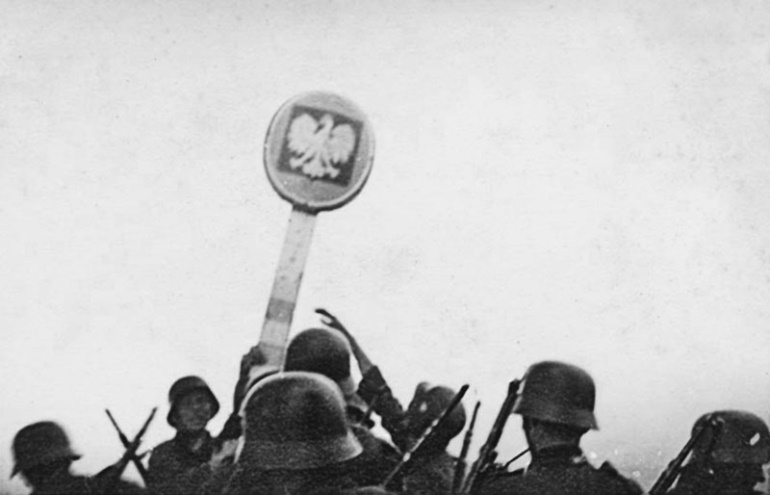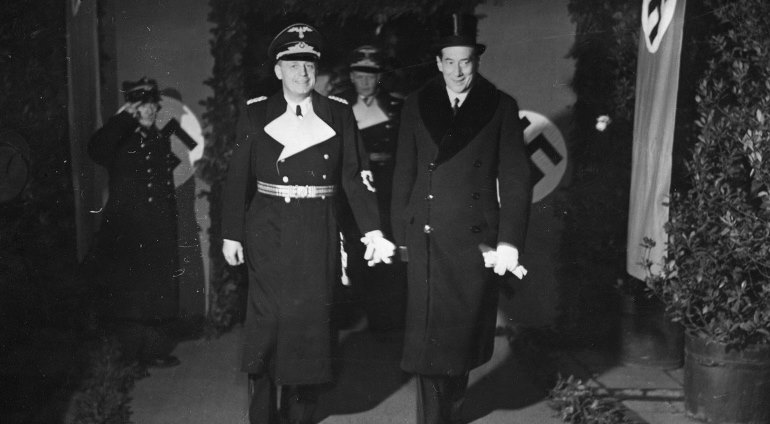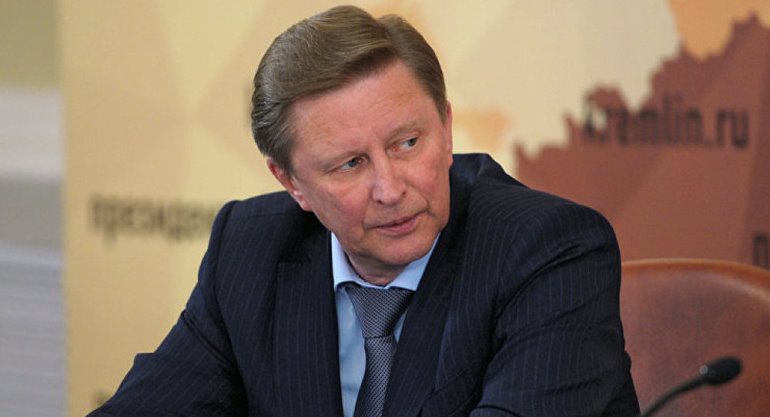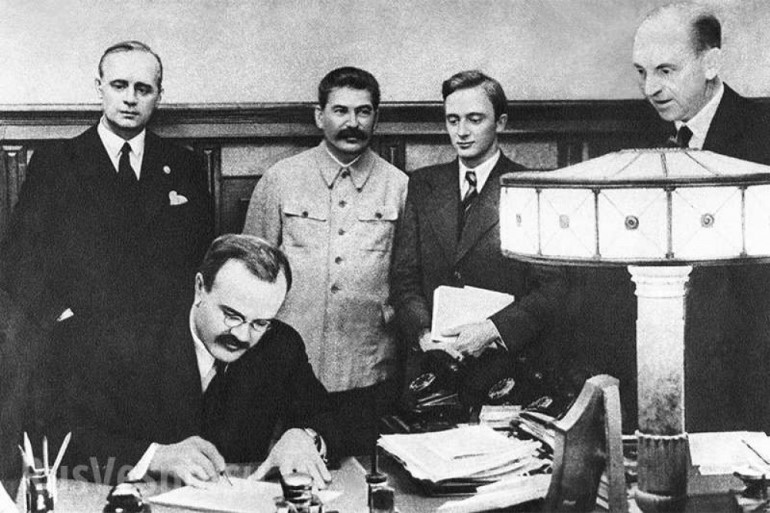
Sergey Ivanov: Stalin won time for the victory by making pact with Hitler
/ Главная / Russkiy Mir Foundation / Publications / Sergey Ivanov: Stalin won time for the victory by making pact with HitlerSergey Ivanov: Stalin won time for the victory by making pact with Hitler
On August 23, 1939, Moscow signed a sensational non-aggression pact and a secret protocol to it with Berlin. Nowadays, many Western historians and the media consider this agreement almost an evidence of the criminal union of Stalin and Hitler, who divided Eastern Europe between themselves. But did the Soviet leadership have a choice? This is discussed by the Chairman of the Board of Trustees of the Russian Military-Historical Society Sergey Ivanov.
- When and why did the relations between the USSR and Germany begin to change and whose initiative was it?
- In the 1930s, the USSR took a clear anti-fascist, and therefore anti-German stance. Relations with Germany began to gradually change only after the Munich agreement, with Berlin taking the initiative, first in the form of a probe of the position of the USSR. However, Soviet leaders, who were focused on building a coalition with England and France, were wary about it and were reluctant to meet German proposals.
According to the acknowledgment of serious, and even Western historians, until mid-August 1939, right up to the failure of tripartite negotiations, Stalin aimed to create an anti-Hitler coalition with France and Great Britain. The Soviet Union was well aware that the foreign policy concept of the Third Reich was directly connected and merged with Nazi nonsense about the "living space" not somewhere in Africa, but in the East: as Hitler said, in Slavic lands. Therefore, Berlin remained our main enemy.
But what did Stalin have to do in case the negotiations with the British and French failed and on the eve of the German invasion of Poland? In this situation, when the armed conflict on Khalkhin Gol continued, he first of all had to think about the national security of the country. It was necessary to delay the beginning of the war with Germany. And why did the USSR have to be the first to enter the war against Nazi Germany, contrary to the clearly stated opinion of the Polish government, and impose its defence on the Poles, send their soldiers to death to save Poland when Great Britain and France did not want to fight it?

Photo 1. German invasion of Poland. Photo credit: liveinternet.ru
- Why did the Anglo-Franco-Soviet negotiations in Moscow fail in the summer of 1939? It was often heard that the Soviet leadership deliberately thwarted the signing of an agreement with England and France and only imitated the negotiation process in order to induce Hitler to an agreement with the USSR.
- Such kind of accusations have been and are frequent now. But if one studies the course of the Anglo-Franco-Soviet negotiations in more detail, their inconsistency becomes very clear. Let's look carefully: on March 18, the British government asked the Soviet Union and several other countries about their position in the event of a German attack on Romania. In response, Moscow proposed convening an international conference with the participation of Eastern European countries, not considering it possible to discuss the fate of Romania or Poland with Great Britain without representatives of these most interested states. Then London proposed signing a joint declaration - but Poland refused! But how to sign a declaration in defence of Poland without Poland itself? At that time no one guaranteed that Poland would not yield to Hitler pressure and would not accept Germany’s demands without war. As a result of this development of events, Poland would have become a vassal, Germany’s junior partner in the aggressive coalition. Then the probability of a combined attack on the USSR by the German and Polish armies, the unification of the military potentials of the two states towards general hostility to the USSR could become too high.

Photo 2. Foreign Ministers of Germany and Poland Joachim von Ribbentrop and Poland Jozef Beck. Photo credit: polskieradio24.pl
In January of 1939, during the negotiations between Ribbentrop and Beck, the German foreign minister proposed to Poland this scenario exactly. Soviet intelligence, as we know today, informed the Kremlin about the content of these negotiations.
Nevertheless, on April 17 Moscow proposed to London and Paris to conclude a tripartite agreement on mutual assistance. The position of the Polish government and the governments of the Baltic states remained the stumbling block in the negotiations. The USSR did not have a common border with Germany. How could the USSR have entered the war with Hitler if both Poland and the Baltic states through the mouths of their diplomats had repeatedly stated during this period that "no soldiers from Soviet Russia would be allowed to enter their territory", if they had flatly refused to talk about any guarantees of independence and territorial integrity on the part of the USSR?
The unconstructive position of these states, the irrational anti-Sovietism of the Polish elite made the conversation or even the signing of some kind of military convention on creation of a new Entente on the model of the First World War with the USSR, France and England meaningless. Nevertheless, the Kremlin tried to do something to the very end - we know that the British and French diplomatic missions reached Moscow in August 1939. And only when during the Moscow talks it became clear that nothing could be signed except a “declaration of intent”, that Poland would not be able to agree to accept Soviet help - only then the Kremlin made a choice in favor of contacts with Berlin.
- Was there a discussion in Stalin’s close circle about the strategy of the USSR in relations with Germany? Was there a consensus in the Soviet leadership about the need to sign a non-aggression treaty?
- Back at the time, such issues were decided by a narrow circle of leaders of the country. In addition to Stalin, it included Vyacheslav Molotov, Andrey Zhdanov, Georgy Malenkov and some others. Among the military, it is necessary to name, first of all, the People's Commissar for Defense of the USSR Kliment Voroshilov. An analysis of the political course of Western democracies and the course of trilateral negotiations left no room for doubt: the British and the French, who were following them, sought to forward the German aggression to the East.
Therefore, there was consensus on the issue of signing a non-aggression pact with Germany between the top Soviet leaders. When it became finally clear during the tripartite negotiations that a military convention with England and France could not be concluded, the USSR signed a loan agreement with Germany on August 19, and a non-aggression agreement and a secret additional protocol to it on August 23.
- In your opinion, could Poland have received help from France and England if the Red Army had not crossed its eastern border on September 17?
- Poland was doomed because of the arrogance of its own leadership, which rejected the USSR’s initiative to create a collective security system in Europe, and the French’s unwillingness to “save” it. By September 17, the main forces of the Polish army were defeated or agonized in encirclement; Warsaw, the center of military and political control of the country, was cut off by German troops, the government intended to emigrate and was already preparing to cross the border; the major part of the not so numerous Polish fleet left to join the British fleet even before the outbreak of the hostilities and abandoned attempts to defend its own coast.
What can I say if, on September 9, the Polish leadership began negotiations with France on granting asylum to the government? It means that back in the day they understood everything and decided to run away. By the way, the Polish president left Warsaw on the day the war began - September 1, the evacuation of government agencies began on September 4, the government left on September 5, and the commander of the Polish army Edward Rydz-Smigly left on the night of September 7.

Photo 3. Sergey Ivanov. Photo credit: fr.sputniknews.com
If England and France really had wanted to help Poland, they would have easily crushed the weak German barrier on the German-French border, where their superiority was overwhelming, but they never did. It is no coincidence that this part of the war in the West is called "strange" or "sedentary": on November 21, the French government created an "entertainment service" in the army, the parliament discussed the issue of extra alcohol to soldiers, canceled taxes on playing card games for the "active" army and purchased ten thousand game balls ...
- Perhaps, if there had not been a Polish campaign, it would have been easier for the Red Army to defend against the Germans on the "Stalin line", which was already prepared?
- None of the lines of defence created on the eve of World War II in European countries justified itself: the attacked ones were eventually broken or surrendered. In this mobile war, distances were deciding more than milestones. And if Germany had been preparing an attack on the western border of the USSR of September 16, 1939, the chances of holding Leningrad would have been illusory, Minsk and Kiev would have fallen even earlier. But most importantly, there would have been even less opportunities to evacuate defence enterprises, and even if we had survived in this case in 1941, in 1942 we would have practically nothing to fight with.
Were it not for the pact, in 1941 German troops would not have had to fight their way through hundreds of kilometers in Western Belarus and Ukraine. They would have started the offensive from much more advantageous positions and would have reached Moscow and Leningrad even earlier than this actually happened. Would Moscow resist in this case? Exchanging territory in the summer of 1941, the Soviet command was able to mobilize and arm dozens of divisions, which ultimately were able to stabilize the front and then push the Germans away from Moscow.
- What influence did the U-turn in relations with Germany have on Soviet society? To what extent did the rejection of harsh criticism of the Nazis disorientate society and the power elite in the early 1940s?
- Communists from different countries expressed bewilderment when criticism towards Nazi Germany ended after the conclusion of a non-aggression treaty with it. But no one spoke out publicly. People within the country also asked this question. Although the vast majority of the population understood that the agreement with Germany was a necessary step. Since Germany remained a Nazi state with a hateful ideology and aggressive plans, there was no doubt that the agreement with it was a temporary maneuver. The military understood this best of all.

Photo 4. The signing of the Non-aggression Treaty between the USSR and Germany. Photo credit: uenews.ru
- How did Japan react to the Soviet-German treaty?
- The Japanese were shocked. Germany, without asking the opinion of its ally, signed a non-aggression pact with the USSR at a time when the Japanese were at war with the Soviet and Mongolian forces on Khalkhin Gol. As a result, the Japanese government resigned due to a treaty concluded by its ally!
I believe that the defeat at Khalkhin Gol and the Soviet-German treaty turned the vector of Japanese aggression in the direction of the south. The act of Hitler, who suddenly went to conclude an agreement with the USSR, decreased Tokyo's confidence in the fuhrer of the Third Reich.
- The secret protocols to the Soviet-German non-aggression treaty were condemned by a resolution of the Congress of People's Deputies of the USSR of December 24, 1989. Is it worth considering the cancellation of this decision in the light of the new conditions?
- Russia as the successor of the USSR, of course, has the opportunity to do this. However, we have already suffered all the negative consequences of the adoption of this resolution, since it served the cause of our diplomatic, ideological and actual disarmament before the West in the perestroika era and in the 90s. Now there should be no rush in this matter.
Historians and lawyers can study the situation and issue their verdict for as long as it takes, and on its basis our society, either independently or through legal representation, will decide how to relate to secret protocols and whether to cancel the decision of the Congress of People’s Deputies.
— There are a lot of Western movies nowadays that directly or indirectly expose Russia and the USSR in a negative light; the latest examples are Kursk and Chernobyl. It can be assumed that the history of the signing of the non-aggression pact can become the object of such a speculative scenario. Should we answer back and make a feature, say, about the Munich Agreement of 1938?
- The examples you mentioned illustrate not only the thesis about the anti-Russian vector of these features but their commercial success as well. The demand for such films from a Western audience allows to recoup the cost of their production due to wide distribution. If it is possible to create a good scenario for Munich-1938 or for some other fact and successfully implement it commercially, why not. But creative an expensive feature just to stab someone in the West is a goal that does not justify the means.
Source: Rossiya Segodnya
New publications

 Mikhail Kalatozov, a director who transformed the world of cinematography in many ways, was born 120 years ago. He was a Soviet film official and a propagandist. Above all, he was capable of producing movies that struck viewers with their power and poetic language.
Mikhail Kalatozov, a director who transformed the world of cinematography in many ways, was born 120 years ago. He was a Soviet film official and a propagandist. Above all, he was capable of producing movies that struck viewers with their power and poetic language.  Ukrainian authorities have launched a persecution campaign against the canonical Ukrainian Orthodox Church (UOC), the biggest one in the country's modern history. Over the past year, state sanctions were imposed on clergy representatives, searches were conducted in churches, clergymen were arrested, criminal cases were initiated, the activity of the UOC was banned in various regions of the country, and monasteries and churches were seized.
Ukrainian authorities have launched a persecution campaign against the canonical Ukrainian Orthodox Church (UOC), the biggest one in the country's modern history. Over the past year, state sanctions were imposed on clergy representatives, searches were conducted in churches, clergymen were arrested, criminal cases were initiated, the activity of the UOC was banned in various regions of the country, and monasteries and churches were seized.  When Nektary Kotlyaroff, a fourth-generation Russian Australian and founder of the Russian Orthodox Choir in Sydney, first visited Russia, the first person he spoke to was a cab driver at the airport. Having heard that Nektariy's ancestors left Russia more than 100 years ago, the driver was astonished, "How come you haven't forgotten the Russian language?" Nektary Kotlyaroff repeated his answer in an interview with the Russkiy Mir. His affinity to the Orthodox Church (many of his ancestors and relatives were priests) and the traditions of a large Russian family brought from Russia helped him to preserve the Russian language.
When Nektary Kotlyaroff, a fourth-generation Russian Australian and founder of the Russian Orthodox Choir in Sydney, first visited Russia, the first person he spoke to was a cab driver at the airport. Having heard that Nektariy's ancestors left Russia more than 100 years ago, the driver was astonished, "How come you haven't forgotten the Russian language?" Nektary Kotlyaroff repeated his answer in an interview with the Russkiy Mir. His affinity to the Orthodox Church (many of his ancestors and relatives were priests) and the traditions of a large Russian family brought from Russia helped him to preserve the Russian language.

 The leaders of the Friends of the Great Russia cultural association (Amici Della Grande Russia) in Italy believe that the Western policy of abolishing Russian culture in Europe has finally failed. Furthermore, it was doomed to failure from the beginning.
The leaders of the Friends of the Great Russia cultural association (Amici Della Grande Russia) in Italy believe that the Western policy of abolishing Russian culture in Europe has finally failed. Furthermore, it was doomed to failure from the beginning.  Name of Vladimir Nemirovich-Danchenko is inscribed in the history of Russian theater along with Konstantin Stanislavski, the other founding father of the Moscow Art Theater. Nevertheless, Mr. Nemirovich-Danchenko was a renowned writer, playwright, and theater teacher even before their famous meeting in the Slavic Bazaar restaurant. Furthermore, it was Mr. Nemirovich-Danchenko who came up with the idea of establishing a new "people's" theater believing that the theater could become a "department of public education."
Name of Vladimir Nemirovich-Danchenko is inscribed in the history of Russian theater along with Konstantin Stanislavski, the other founding father of the Moscow Art Theater. Nevertheless, Mr. Nemirovich-Danchenko was a renowned writer, playwright, and theater teacher even before their famous meeting in the Slavic Bazaar restaurant. Furthermore, it was Mr. Nemirovich-Danchenko who came up with the idea of establishing a new "people's" theater believing that the theater could become a "department of public education."  "Russia is a thing of which the intellect cannot conceive..." by Fyodor Tyutchev are famous among Russians at least. December marks the 220th anniversary of the poet's birth. Yet, he never considered poetry to be his life's mission and was preoccupied with matters of a global scale. Mr.Tyutchev fought his war focusing on relations between Russia and the West, the origins of mutual misunderstanding, and the origins of Russophobia. When you read his works today, it feels as though he saw things coming in a crystal ball...
"Russia is a thing of which the intellect cannot conceive..." by Fyodor Tyutchev are famous among Russians at least. December marks the 220th anniversary of the poet's birth. Yet, he never considered poetry to be his life's mission and was preoccupied with matters of a global scale. Mr.Tyutchev fought his war focusing on relations between Russia and the West, the origins of mutual misunderstanding, and the origins of Russophobia. When you read his works today, it feels as though he saw things coming in a crystal ball...